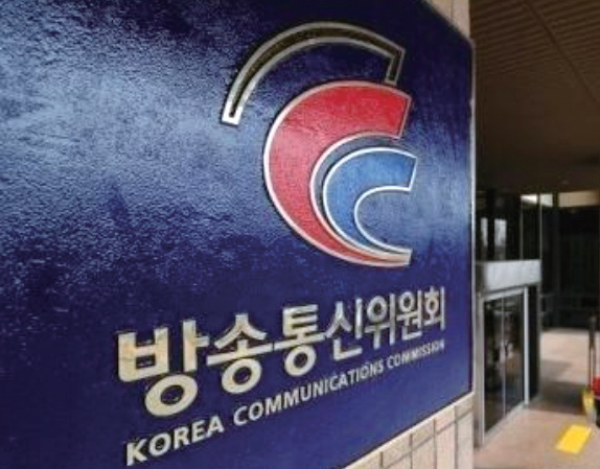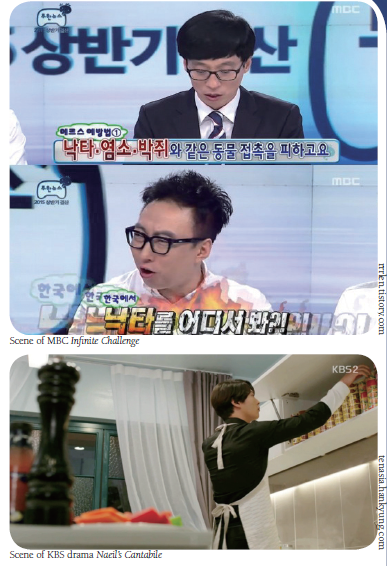Recently, numerous complaints about the extreme violence in an assault scene in the tvN drama My Mister were accepted by the Korean Communications Standards Commission (KCSC). Although the KCSC announced that it would deliberate the scene, the drama production company said that the assault scene was unavoidable due to role in the plot development of the drama. In response, there was a great diversity of opinions about the broadcasting deliberation issue. Broadcasting deliberation has been regarded as a necessary procedure for a long time, but it has also raised many questions about its fairness and validity at the same time. Therefore, the Sungkyun Times (SKT) now examines the current domestic broadcasting deliberation process and its situation, analyzes the problems, and seeks for possible solutions for the future.

The Basics of Broadcasting Deliberation
What is Broadcasting Deliberation?
“Broadcasting deliberation” widely examines and discusses audio and video broadcasted through radio or television. It is done by the KCSC, according to Article 33 (broadcasting deliberation rule) of the Broadcasting Act, and its goal is to inspect the fairness of content for the public. In deliberation rules, basic orders for public broadcasts are included, such as the respect of human rights, equality of the sexes, or limits on indirect advertisement. Since radio is communal and broadcasts should be public, an extent of regulations are needed. Broadcasting deals with social phenomena in which various interests are involved. Moreover, because perspectives of individuals vary greatly from person to person, broadcasting is always caught up in controversy. According to the “2016 Current state of public deliberation application”, complaints accepted by the KCSC has been increasing every year (from 1,306 in 2012 to 3,016 in 2014). There should, therefore, be a subject to judge and take actions for those problems, when complaints or objections are presented.
Process of Broadcasting Deliberation
The main subject of broadcasting deliberation can be divided into two: the broadcaster itself and the KCSC, which is an external agency. Self-regulating deliberation carried out by a self-deliberating organization in broadcasting is also enforced. It is encouraged as a form of pre-censorship for all programs except for reporting programs as a rule. Deliberation done by KCSC, on the other hand, is called heteronomous-regulation, which is done afterward. After the deliberation of the KCSC, certain disciplinary results and actions are decided, such as administrative guidance, legal sanctions, or penalties. While the KCSC just informs broadcasters about the deliberating result when they get an administrative guidance like opinion presenting or recommendation, the KCSC requires the Korea Communications Commission (KCC) of disposition instruction including legal sanctions like cautions or warnings. A lot of complaints were filed, for instance, regarding a female disparaging rap on the Mnet entertainment program “Show me the Money 4” in 2015. The highest punishment was imposed according to the deliberation articles about gender equality and broadcasting language.

Problems of Domestic Broadcasting Deliberation
Broadcasting deliberation has been done for a long time in Korea for its publicity and fairness. Due to the nature of the deliberating organization and the abstract Broadcasting Act, however, there has been a criticism that it undermines the intrinsic value of entertainment programs as well as news programs.
Excessive Deliberation Violating the Freedom of Expression
Since the entertainment and music programs are the main targets of the deliberation, the KCSC sometimes regulates the contents of them excessively and infringes upon the freedom of artistic expression. In the case of deliberating lyrics of songs, there is a criticism that it overinterprets and sanctions only a specific part of a song, not focusing on the meaning of the whole song or the intention of the producer. The music video of Lee Hyo-ri’s “Chitty Chitty Bang Bang” (2010), for example, was judged to be ineligible for broadcasting according to the Road Traffic Law, because she danced on the road instead of the sidewalk in the video. Such deliberation violates the freedom of expression without considering the music, and music video, as a form of art.
Inequality in Punishment Levels Due to Vague Rules

Broadcasting deliberation rules based on the Broadcasting Act are abstract and extensive, making it difficult to deliberate contents consistently. The current broadcasting rules include the phrase “it should not ~ too much” six times. The higher the ratings or the more attention a program has, the stricter the standards become when deliberating. In fact, specific programs which are popular and have many viewers are monitored more strictly, with complaints and requests focused on a few programs. The MBC entertainment program “Infinite Challenge”, one of the most popular Korean programs, for example, was subject to administrative guidance for satirizing the prevention of Middle-Eastern respiratory syndrome coronavirus (MERSC) announced by the health authorities in 2015. Even though “Infinite Challenge” did not misinform the public or degrade anybody, as it was just a satirical situation. Many said that the program was punished just because it was “Infinite Challenge”, criticizing the criticism for being unfair. Unpopular programs with low viewers, on the other hand, are likely to avoid necessary deliberation easily, even if they violate the Act. In the KBS drama ‘Naeil’s Cantabile’ (2014), for example, tuna cans appeared all over the set, and there were two large refrigerators in the room of the protagonist which was deemed as excess indirect advertisement. No deliberation, however, had been taken, because the KCSC did not put any emphasis on such unpopular programs.
Lack of Representativeness in Composition of KCSC Committee
Even though the KCSC is a civilian organization, it is composed of six members from the ruling party and three members from the opposition party. It can be said that this composition, combined with politics, neglects the independence broadcasting. Although the neutrality and independence of KCSC should be legally guaranteed, the government has a huge influence. For example, the KCSC enforced a broadcasting deliberation on three reports of JTBC, including the tablet PC report which became important evidence during the recent political scandal involving Park Geun-hye in 2016, ending up with JTBC punished. In addition, there is currently no female members of the KCSC committee, lacking a balance between males and females. Even though the KCSC should discuss various contents of broadcasts, there surely is limitation in dealing with issues of gender equality, since the organization is composed only of male members.
How Can Domestic Broadcasting Deliberation Be Improved?
As mentioned above, current domestic broadcasting deliberation is being criticized for its procedural and structural system. Therefore, finding out practical plans for better deliberation is needed, in order to solve the aforementioned problems.
Relaxation of Excessive Deliberation
In order to ensure the fairness and objectivity of a program, the strict rules of deliberation should be relaxed. Deliberation should be focused on sensationalist issues such as excessive violence or sexual issues while the influence on press activities be minimized as much as possible. In the case of Canada, although broadcasting deliberation on factual or balancing issues is done in detail, opinions based on facts are judged generously even if they are controversial. Accordingly, various opinions can promote the discussion within the community. Furthermore, there is also a need to reconsider current unnecessary restrictions applied to entertainment and music programs. Since their goal is to get people interested and entertained, regulations should be done to the extent of where the freedom of expression is being guaranteed.
Revision of Ambiguous Rules
Since the current deliberation laws are too ambiguous and the interpretation or application is done arbitrarily, a clear deliberation law is necessary. In the case of the United Kingdom (UK), all standards are codified based on a long history of broadcasting deliberations, so that anyone who deliberates a certain program will see the same result. The deliberation rule of UK about fairness, for example, states that people who deliberate should review fairness according to the ‘context’, and that context is divided into eight categories such as the content of the program or its potential effect on the viewers. A deliberation system and its rules should be improved in order to make consistent judgments in individual cases, despite the difficulty to codify all of them in detail.
Reconstitution of Committee Members in KCSC
Due to the current composition of KCSC members, deliberating decisions on politically sensitive issues has become another problem in terms of fairness and political interpretation. It is highly contradictory for an organization suspected of misjudgment to deliberate fairness of broadcasts. Moreover, members representing the various sectors of society should be included instead of the National Assembly or the President for a complete independence and civilization of the KCSC. Specifically people from the legal profession and viewers groups should be included as the representatives. In addition, reformation of the gender structure of the KCSC is necessary in order to achieve better gender equality in the media. The KCSC should include female committee members to examine sexual issues appearing in broadcasting more objectively, and gender experts are also needed to reflect and interpret the reality more accurately.
Activation of Self-Deliberation Within the Broadcasters
Thorough self-deliberation should be carried out in advance within broadcasting to mitigate the excessive heteronomous regulations imposed by the KCSC. In Korea, each broadcaster has already established its own deliberating department according to the broadcasting laws. Since the ratings of programs are directly related to their profits, however, some violent and provocative elements are still not filtered out through self-deliberation. In order to preserve both the freedom of expression and publicity, self-deliberation institutions in each broadcasting organization should strengthen their examination to the extent that after-deliberation is unnecessary. Therefore, structural improvement is needed to enable self-deliberation. The inclusion of experts from the legal profession in the self-deliberation department of each broadcaster, for example, should be mandatory and the revision of the broadcasting laws applied to each broadcasting company should be more clear. In the case of the United States (US), the broadcasting deliberation system is similar to that of Korea, but their self-deliberation is done very actively. Based on the guidelines of the Federal Communications Commission (FCC), each self-deliberation department makes its own concise regulating laws and all programs go through 100% preliminary self-deliberation beforehand. Korean broadcasting deliberation also needs to be organized through a self-reviewing system and specific deliberating rules for each broadcaster should result in better self-deliberation.
The broadcasting deliberation system of Korea has experienced many changes internally. Moreover, the domestic broadcasting environment is still changing due to the development of broadcasting communication such as an increase in the number of channels and programs or the introduction of new technology. Nevertheless, the fact that both broadcasters and the KCSC should aim at broadcasting for the nation has not changed. Since broadcasting is social and communal, reform of old deliberating rules and committee composition is necessary. Clear deliberating laws should be established as soon as possible, considering the socio-cultural characteristics of Korea.
